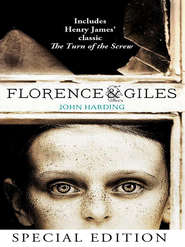По всем вопросам обращайтесь на: info@litportal.ru
(©) 2003-2024.
✖
John Harding 2-Book Gothic Collection
Настройки чтения
Размер шрифта
Высота строк
Поля
‘My, what a lot of food gets wasted,’ I said, as she resumed her task of scraping the plates into the bin and instantly regretted that I too had joined the Giles school of theatricals, but Meg was intent on her task and seemed not to notice.
‘Why yes,’ she said, ‘and it gets worse all the time.’ She looked up at me. ‘You really should eat your supper at your age, Miss Florence, then you’d have no need to come in here begging for cookies.’
‘But I ate all my supper,’ I said. ‘And Giles ate lots. Haven’t you noticed the leftovers have increased since Miss Taylor came?’
Meg thought about this. ‘Well, now you mention it, miss, perhaps I have.’ She pondered a moment, then shrugged and scraped the last plate noisily into the bin, the knife rasping against the china, so setting my teeth on edge that it was all I could do not to cover my ears with my hands. ‘Well, the lady must be eating like a bird then, Miss Florence, for if it’s as you say and that plate was hers, then she has left the whole of her pork chop, no matter it’s in pieces. She evidently gets her fun out of cutting rather than eating.’
I shivered at this. Ah, my dear, I could eat you! sprang into my mind, the memory of her greeding over Giles in the night, as if she could scarce resist the temptation to sink her teeth into his tender flesh.
‘Still,’ said Meg, ‘some of these highfalutin’ ladies, the sort of folk who give themselves airs and graces, are like that. Obsessed with their figures. I count myself fortunate that I’m not one of them. I have better things to do than go around all day worrying about my waist.’
As if to confirm this, having finished clearing the plates, she went back to the cupboard, took out the cookie tin again and we both had another go at it.
17 (#ulink_b8e5ac23-fad2-566b-912b-3e641719c1c2)
What was I to do now? Here I was, a twelve-year-old girl, orphaned, all alone in the world save for a few fond but stupid servants and, of course, my little brother who, far from being able to aid me, rather required of me protection for himself. I thought to write my uncle but then thought more and realised I could hope for no succour from that quarter. For one thing, I was not supposed to be able to write at all and from what I knew of him a letter from me was likely to bring not assistance but some form of retribution for having so disobeyed him as to literate myself. That aside, he hated having any interference upon his time from us at Blithe and indeed had kicked up a mighty stink in his letters at the time of the Miss Whitaker incident, especially at the publicity of the inquest, when he found his business matters suddenly so pressing that he could not even spare the time to attend the proceedings.
It never but amazes me how clever is the human mind, or my own mind, at least. For here I had no sooner begun hopelessing my position and dismissing any idea of help from one quarter, my uncle, than my mind, continuing to work on its own, without any aid from me, leapt from that to the inquest and then to something else that possibly solutioned the whole thing. Captain Hadleigh. Here was someone who was intelligent and well educated but with nothing of that air of superiority grown-ups habituate toward children, a man who was prepared to listen to what you might want to tell him.
Now it trued that Captain Hadleigh was by no means my friend. I well remembered our first interview, when he sat behind his desk with his fingers steepled before his face, the tips pressed to his nose, and listened to what he referred to as my ‘version of events’.
I told him what I had already told the police officer who had questioned me immediately after the ‘event’, pausing frequently in my story to dab my eyes with my handkerchief, for I could not unflow my tears, or to draw a deep breath before plunging in on the next bit. He listened uncommenting to the whole thing and then sat for a moment in silence, his eyes peering at me from above his fingertips as though I were a dead animal or a bird that he was about to dissect.
‘Did Miss Whitaker fall straight into the water?’ he asked at last.
‘Why, yes, leastways, I think so.’ I paused a moment, trying to remember. ‘Yes, I’m pretty sure she did. Like I said, she got up to take the oars from me and the boat kind of rocked and then she stumbled and I think maybe tripped upon the hem of her gown and over the side she went.’
He sat and thought some more. ‘And that’s all that happened?’
‘Yes sir. Far as I remember. Of course, it all happened so fast.’
‘And you say she went straight into the water?’
‘Yes sir, straight in.’
‘She didn’t hit her head on the side of the boat as she went over?’
It was again my turn to think. I screwed up my eyes trying to picture the scene, but got only a blank. But although I saw nothing I did seem to recall a sound. ‘Well, sir, now that you mention it, there was kind of a loud crack before the splash. The sort of noise a human head might make against wood, if you know what I mean.’
‘No, young lady, I don’t know what you mean. I have never heard the sound of wood on bone.’
We sat there silencing another age or two. I twisted my sodden handkerchief around my fingers. He stared at me some more. I uncomfortabled but I wasn’t about to be shaken by some young whippersnapper like him, so I carried on staring right back.
‘She could have hit her head on the side, that could have been the sound. I don’t rightly remember. Like I said, it was all so fast.’
‘Very well,’ he said. He peered at me over his fingertips again, as if they were a gunsight and I the hapless prey. ‘And when she went into the water, did you not try to rescue her?’
‘Why yes, sir. Leastways, I wanted to but her falling seemed to make the boat skid away from her. I was much too far off to reach her.’
‘Come now, it takes some time for a person to drown. You could have rowed the boat back to her.’
‘Oh, no sir, I hadn’t the oars. As I have told you, Miss Whitaker was in the act of taking them from me when she overbalanced and went into the water. The oars went with her, sir, and were as out of reach as she was.’
He said nothing.
‘The oars were found floating on the lake afterward, if you remember, sir. I did try paddling the boat to her, with my hands, but I was then something like twenty feet away from her, the boat had so drifted. The problem I had was the boat was too wide for me to get both hands in the water at the same time, sir, and paddling with one hand at a time just made it turn a circle, sir.’
He nodded at this, recognising it as a detail that only one who had tried it could describe. ‘Very well, that’s all for now,’ he said at last. ‘You may go.’
I was near out the door when his voice caught up with me and hauled me back. ‘Oh, just one more thing.’
I turned. ‘Yes…?’
‘That noise, that head on wood noise, or should we say wood on head? Couldn’t have been an oar, by any chance?’
I stared him out again, aware of the blood draining from my face.
‘That I couldn’t tell you, sir,’ I said, ‘for it’s a sound I have never heard.’
We had two or three more encounters after that and it every-timed the same, he’d hark back to the business of the sound and again-and-again me about the oars, but I had nothing to add. I felt he unsatistfied the whole thing in some way but put that down to the man’s nature and the exigencies of his job. In the coroner’s court I would often catch him looking at me as if I were some puzzle he couldn’t quite figure, an object of fascination to him. I had plenty more of the same questions from the coroner, who was a kindly old man who told me to sit down when I gave my evidence and made his clerk fetch me a glass of water. Answering him and upglancing and seeing Hadleigh with his eyes upon me then, I couldn’t help wondering if this had been all along the point of his interrogations, to rehearse me for when the proper questions came. I felt that if we had met under different circumstances, a ball perhaps – not that I had ever been to one – or on a skating rink, Hadleigh would have liked me, but because of the Whitaker affair, I confounded him quite.
So why now did I think Hadleigh would want to help me? Why would he believe my story, even suppose I could get to tell it to him? It was a big thing to expect a grown man, a sceptical police officer, to swallow – more like a fairy tale than a proper mystery – that my brother and I had a wicked governess who was plotting to steal him. Moreover, that she might not be human, but some manifestation from another world, even our previous and now dead governess, scorning the next world for this.
Then again, for all that he had not friendlied me, but continued to examine me with those sharp blue eyes of his, Hadleigh had proved my saviour in all the business of Miss Whitaker’s brother, specially in that awful scene in the courtroom when the man stood up and shouted, such terrible things that I had to cover my ears, that it was all a whitewash, that his sister’s death had not been properly investigated, that her employer was to blame for letting her on the lake with no one but a child to save her, that there was ‘something fishy about the whole thing’.
I felt near to have died from the shame of it all, with everyone’s eyes feeding off me, like crows on a dead rabbit, but it seemed no sooner had the disturbance started than Hadleigh and his men were upon Whitaker and had his arms pinned behind his back and him marched out of the room and not let back in again for the rest of the proceedings. It was the same when I outed the courthouse and again when I returned next day. Whitaker lay in wait for me but just as we pulled up in the horse and trap Hadleigh had his men upon him and him whisked away and no more harm done. I suspicion that he scared the man off too, for I never eyeclapped him again.
So the situation with Hadleigh was like a finely tuned balance, with not much required to tip it one way or the other. On the one hand, he had knight-in-armoured me, saving me pain and humiliation at the hands, or rather from the mouth, of Miss Whitaker’s brother. On the other, he looked at me as if I were his special study, an enigma only he could solve, and his protection of me from Whitaker no more friendly to me than that. Still, I nothing-elsed, I had no other to turn to. It was Hadleigh or no one.
Deciding that I had nothing to lose by seeking his help was not the same, though, as getting it. The police station was in our little town. It was eleven miles away and I had no way of getting there except for carriaging by John. But I could not just say, ‘I want to go into town,’ it would not be allowed by Miss Taylor, indeed had never been allowed before she came, even by Mrs Grouse. Giles and I hardly evered to town, for all our needs were met at Blithe, where we were fed and watered and measured for our clothes and doctored when we illed.
This last made me think. We were doctored but we were not dentisted. Once, when I was smaller and had an aching baby tooth, they took me into town to see Mr Field, the dentist, an ornery old man who evidently hated his job and even more so when it involved children. Now it obvioused me that a dentist could not call upon me at Blithe, for he would need his equipment, the heavy leather and brass chair, which he could pump up with a pedal to bring you to his height, and the looming flamingo threat of his drill, which I had never seen in action but only heard from the waiting room, although that was enough to shiver me quite.
I thought at first of complaining of toothache so I would have to be taken to Mr Field, but that would not do, for if Miss Taylor came too, as well she might, then it would not opportunity me to visit the police station to see the captain. Only one solution suggested itself to me. Giles would have to be the one who visited the dentist. I would accompany him and, when the moment opportunitied, slip away to the police station.
It was a couple of days before I aloned with Giles, long enough to put my plan to him. His reaction was no more than I expected. ‘The dentist? Ask to see the dentist? No fear! I’m not being drilled and filled or having my teeth pulled out one by one. The Spanish Inquisition used that as a form of torture, you know.’
‘But, Giles, you wouldn’t have to have your teeth drilled or taken out. There’s nothing wrong with them.’
Giles inserted a finger into his mouth and ran it over his teeth, checking. ‘How can you be so sure? What if I get there and old Field spots something and gets that drill of his going?’
‘But he won’t, Giles, because there’s nothing wrong with your teeth.’
‘Oh, yes, so you’re a dentist now, are you? And anyway, what if he says there’s something wrong with one of ’em even though there’s not, just so as he can pull it out and collect a fat fee?’
‘He wouldn’t do that. It’s not allowed. It’s…it’s…it’s against the Hippocratic oath.’ I uncertained the truth of this, but when I explained what the oath was to Giles he didn’t question it, which just goes to show that if pulling out good teeth isn’t against it then it should be.
Giles suspicioned me one, weighing up his options. ‘You’re sure he won’t do anything to me?’








